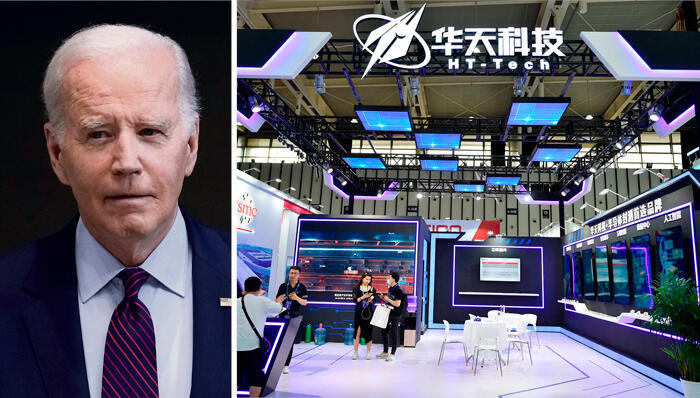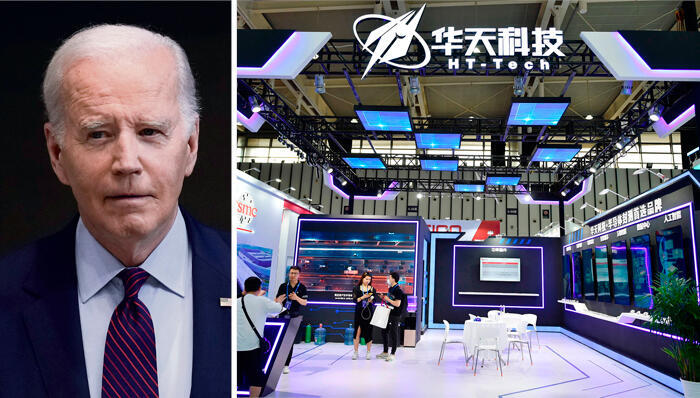
Analysis
Biden tightens screws with China investment restrictions
A presidential order designed to significantly limit China's technological capabilities is driving away American money after years of investment by funds such as Warburg Pincus and Carlyle
There is an expression that Americans are particularly fond of, to turn the screw. That is to put pressure on someone in a measured way. It is good for situations where the party exerting the pressure doesn’t do it quickly and be done with, but exerts pressure over time, in a calculated way, each time increasing the pressure, until it reaches a critical level. The expression is liked by the Americans, not only because it characterizes the methods of operation of the administration and other bodies there, but also because it corresponds, intentionally or not, with a less polite expression: to screw over someone.
This phrase is particularly appropriate for the policy that the Biden administration has been leading against China in the last year, in regards to undermining the country's ability to develop and gain a foothold in advanced technology sectors. It started with a ban on the export of advanced chips to China and continued by promoting restrictions on the export of artificial intelligence (AI) chips and preventing entities in China from accessing cloud services that provide capabilities based on such chips (China, for its part, responded with restrictions on the production of gallium and germanium, critical minerals for the production of advanced chips of which it controls most of the global supply).
1 View gallery


US President Joe Biden, a technology exhibition in Nanjing
(Photos: AFP Susan Walsh/AP)
Now comes the next step: a ban on American investments in quantum computing, advanced chips and artificial intelligence in China - another turn of the screw that significantly increases the pressure on China. Now the question is who will be screwed harder.
The latest move is implemented through a presidential order presented by President Biden last week and will take effect next year. The order allows the Secretary of Commerce to prohibit or limit investment by American entities in the fields of processors and microelectronics, quantum computing and artificial intelligence systems. It is expected to mainly affect investment funds, venture capital funds and American private entities or investors that have invested in joint ventures in China.
According to the presidential order, China's development efforts in these areas threaten the national security of the United States. "Rapid advancement in semiconductors and microelectronics, quantum information technologies, and artificial intelligence capabilities by these countries significantly enhances their ability to conduct activities that threaten the national security of the United States. Advancements in sensitive technologies and products in these sectors will accelerate the development of advanced computational capabilities that will enable new applications that pose significant national security risks, such as the development of more sophisticated weapons systems, breaking of cryptographic codes, and other applications that could provide these countries with military advantages," read the executive order.
A senior administration official told the Financial Times that the order would make it possible to create a "very focused" program that would address the three sectors specified in it. "We want to provide clear guidance on what is prohibited," he said. Another senior official added: "The order will protect national security in a very focused way, while maintaining the long-term commitment to open investment." A classic American spin, because there is no such thing as an open investment if it is not possible to invest in the most sought-after technological fields.
The extent of the presidential order's impact is still not entirely clear and depends largely on how the Secretary of Commerce chooses to implement it. These are not coincidences. The Biden administration is interested in preserving room to maneuver vis-a-vis China, amid efforts to renew contacts at the highest levels between the two countries. These were frozen after a Chinese spy balloon was detected over U.S. soil at the beginning of the year. In this context, the threat of an investment ban can yield more significant gains for the administration than the actual implementation of such a broad ban.
But although the future scope of the impact is unclear, some impact is already being felt on the ground. The founder of a chip startup from Shanghai told the "Financial Times" that with the publication of the order he decided to take his operations out of China, saying that otherwise his financing options would be very limited.
Private investment groups such as General Atlantic (which invested in TikTok's parent company and Shein), Warburg Pincus and Carlyle have invested billions of dollars in China's technology sector in recent years. However, against the background of the change in the sentiment of the American administration regarding the country, in the last year they began to reduce their exposure to it. According to the "Financial Times", the investments of these groups dropped from $47 billion in 2021 to $2.4 billion last year and $2.8 billion in 2023 to date. Venture capital fund Sequoia made a proactive step in June by opening a separate entity for its activities in China.
The AI investment ban could turn out to be particularly critical, as it could slow down or discourage American investments in a wide variety of Chinese companies.
President Biden has set himself a fundamental strategic goal, to limit China's ability to develop the technologies that will dominate the future. He understands very well that whoever controls these technologies will control the world economy in the next 50 years, and is very determined that it will not be the biggest ideological and economic rival of the United States. The question is whether the measures he takes end up not only harming China, but undermining the global investment ecosystem in a way that will lead to a decrease in investment in these areas, and as a result, harm to the people of the entire world.














